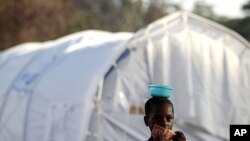Thousands of Ivorian refugees living in Liberia and thousands of Liberian refugees in Ivory Coast are being voluntarily repatriated by the International Organization for Migration (IOM) and the U.N. Refugee Agency. The refugees are returning to homes they fled during civil wars.
An estimated 79,000 Ivorian refugees still live in Liberia and up to 24,000 Liberian refugees in Ivory Coast.
The IOM says it plans to return 15,000 Ivorian and 15,000 Liberian refugees by the end of June. This will bring to an end the organized voluntary repatriation operation for the Liberian refugees.
But IOM spokesman Jumbe Omari Jumbe says the operation will be extended until the end of the year for the Ivorians, to give them more time to consider whether they want to return.
"I cannot say that the fears are completely eliminated," said Jumbe. "There are pockets of places, which still - they tell us when we register them - some of them express that they cannot return. And that is why the whole exercise is voluntary."
Between 2002 and 2004, civil war broke out between then Ivory Coast president Laurent Gbagbo and the rebel New Forces Movement. Gbagbo lost the 2010 presidential election to Alassane Ouattara, but refused to relinquish power. The second Ivorian Civil War erupted in early 2011 between forces loyal to Gbagbo and Ouattara, the internationally recognized president-elect.
At the peak of the crisis, more than 200,000 Ivorian refugees sought refuge in Liberia. Smaller numbers fled to Ghana, Mali, Burkina Faso and Guinea. Most have returned home, following the end of the civil war and improvement in security.
IOM spokesman Jumbe says the situation of the Liberian refugees in Ivory Coast is of much longer duration.
"Some of them have been there since the 1990s when the first Liberian war started," noted Jumbe. "And others since the end of the second Liberian war - that is 2003... As for the Liberians living in Cote d'Ivoire, the operation will continue up until June, because in June the Liberians living in Ivory Coast will lose their status of refugees. They will no longer enjoy the refugee status."
Jumbe says once the Ivorian and Liberian returnees reach their final destination, the International Organization for Migration will provide them with essential non-food items to help them restart their lives. He says the World Food Program will give them a one-month supply of food.




